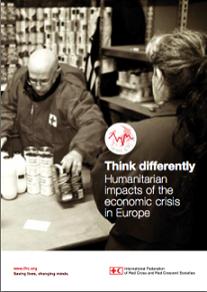IFRC, (2013), Think differently: Humanitarian impacts of the economic crisis in Europe, Geneva: International Federation of Red Cross and Red Crescent Societies. During the first half of 2013, the International Federation of Red Cross and Red Crescent Societies (IFRC) carried out a mapping exercise across the 52 National Red Cross and Red Crescent Societies in Europe and Central Asia (IFRC Europe zone). 42 National Societies responded and this report is …Read More
Eurozone fails to cheer recovery
Steen, M., (2013), “Eurozone fails to cheer recovery”, The Financial Times, 10 October. Why is no one cheering? Technically, the eurozone exited its 18-month recession in the second quarter and is back on the path to growth. Yet its supporters – and critics – have remained silent. Mario Draghi, president of the European Central Bank, may have the answer. “I see a recovery that is weak, that is uneven, that …Read More
OECD Skills Outlook 2013
OECD, (2013), OECD Skills Outlook 2013: First results from the survey of adult skills, Paris: OECD. Key Findings of the Survey Progress across generations Some countries have made impressive progress over recent decades in equipping more people with better literacy and numeracy skills. Young Koreans, for example, are outperformed only by their Japanese peers, while Korea’s 55 to 64 year-olds are among the three lowest-performing groups of this age. Older …Read More
Atypical forms of employment contracts in times of crisis – Working time reforms in times of crisis
Lang, C., Schömann, I. and Clauwaert, S., (2013), “Atypical forms of employment contracts in times of crisis”, European Trade Union Institute, Working Paper 2013.03. This working paper builds on previous research undertaken by the ETUI on the impact of the economic and financial crisis on labour law reforms in EU Member States. It maps the landscape and evolutions in the regulation of atypical employment contracts, analysing how some of these …Read More
The Myth of German Euroskepticism
Gros, D., (2013), “The Myth of German Euroskepticism”, Project Syndicate, 09 October. For example, a recent briefing note by Open Europe claims that German citizens tend to trust the European Parliament less than their national parliament and detects a trend of declining German trust in EU institutions since the start of the crisis. Similarly, a commentary by the European Council on Foreign Relations states: “Trust in the EU has plummeted …Read More
Crisis over in the eurozone? Not in the real world
Traynor, I., (2013), “Crisis over in the eurozone? Not in the real world”, The Guardian, 09 October. According to the detailed study being released on Thursday by the International Federation of Red Cross and Red Crescent Societies: “The long-term consequences of this crisis have yet to surface. The problems caused will be felt for decades … The economic crisis is creating the conditions for a widespread social crisis, whereby a …Read More
World Economic Outlook
IMF, (2013), World Economic Outlook, Washington DC : International Monetary Global economic prospects have improved again, but the bumpy recovery and skewed macroeconomic policy mix in advanced economies are complicating policymaking in emerging market economies. Chapter 3 examines the prospects for inflation, particularly because inflation was remarkably stable in the wake of the Great Recession and, in fact, has become less responsive to cyclical conditions. Chapter 4 examines whether today’s …Read More
How to make Europe’s incipient recovery durable – A rejoinder
Buti, M. and Padoan, P.C., (2013), “How to make Europe’s incipient recovery durable – A rejoinder”, VoxEU, 08 October. Our recent Vox column triggered an interesting and lively debate (see for instance Krugman, 2013; Fatas, 2013; Watt, 2013). In it, we argued that weak private investment is partly to blame for the growth shortfall of the Eurozone compared to the US in the past few years and that putting in …Read More
Europe: an end to fallacy
Duff, A. and Verhofstadt, G., (2013), “Europe: an end to fallacy”, European Politics and Policy Blog, 08 October. The Eurozone crisis has generated a number of structural reforms at the European level. In light of the democratic implications of some of these reforms, Andrew Duff and Guy Verhofstadt propose a new ‘fundamental law’ to replace the EU’s existing treaty framework. This incorporates a federal union in which the European Commission …Read More
Angela Merkel’s Pyrrhic Victory
Soros, G., (2013), “Angela Merkel’s Pyrrhic Victory”, Project Syndicate, 07 October. As far as Germany is concerned, the drama of the euro crisis is over. The subject was barely discussed in the country’s recent election campaign. Chancellor Angela Merkel did what was necessary to ensure the euro’s survival, and she did so at the least possible cost to Germany – a feat that earned her the support of pro-European Germans …Read More






